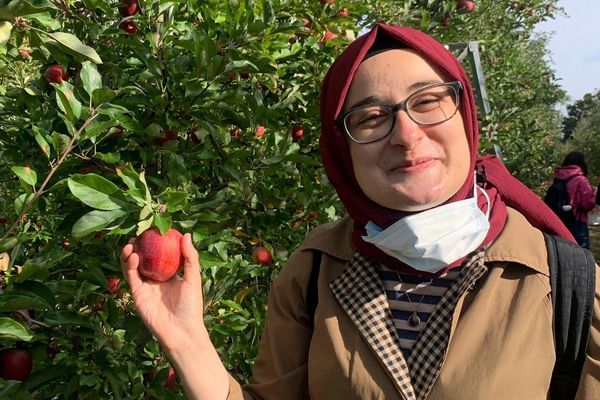
For many in Beita, a town of about 15,000 in the northern West Bank, the killing by Israeli security forces of Fawaz Hamayel last week has left a sense of being collectively orphaned.
“We lost the soul of Beita. He was everything for everyone,” said his nephew Ahmad, of the 47-year-old father of three who was a pillar of the tightly knit community.
He was mortally wounded in what security forces have described as “counter-terrorist activities” in Beita and other locales in the northern West Bank spurred by a deadly wave of Palestinian attacks inside Israel.
Fawaz was known for protesting against the occupation. He played an active role as a nationalist, simultaneously as an official dealing with Jerusalem affairs in the Palestinian Authority, an activist in Palestinian president Mahmoud Abbas’s Fatah organisation, and a driving force behind Beita’s stubborn resistance to efforts to establish a new settlement on its land.
“He was definitely an example to the young people and old people,” Ahmad said.
But neither the man nor his town had clear links to the recent rise in bloodshed, including the killing of three people in a Tel Aviv bar earlier this month.

Beita deputy mayor, Mohammed Hamayel, a distant relative who was with Fawaz at the time he was shot, said he was posing no threat. He had gone outside upon hearing there were wounded Palestinians to discern if there were other residents who were injured and to take pictures, the deputy mayor said. Fawaz used to distribute pictures from Beita to news outlets.
The Israeli army implied in response to a query that Fawaz was a participant in a violent riot in which stones and petrol bombs were thrown by Palestinians.
The death came after 11 months in which Beita residents sustained a costly resistance effort, slinging stones and rolling burning tyres against soldiers guarding the empty buildings of the planned settlement. Troops have used teargas, rubber-coated metal bullets and at times live fire from snipers, according to Palestinians and Israeli solidarity activists.
Fawaz helped organise and document the protests, held after mosque prayers every Friday. Mourners said he had a great memory and was also the town’s “archive”, knowing the dates of the deaths of all of Beita’s “martyrs” including nine shot dead by security forces during the time of the protests.
On 13 April, with tensions rising in the West Bank and Jerusalem, Fawaz woke up very early as usual to clean up the Othman Ibn Affan mosque before the imam arrived. Soon afterwards hundreds of Israeli forces, according to locals, arrived in and around Beita.
Seven Beita residents were injured during the raid, one of them shot in the eye and another in the head, said the deputy mayor. Four people were arrested and later released, he said, adding that security forces had targeted Beita because of its resistance to the settlement. “They steal our land. How can we accept that?” he said. “This will increase our hostility to Israelis and our determination to have our freedom and live in dignity in our land.”
The deputy mayor termed the raid “systemic terrorism”.

Three thousand people, including senior Palestinian Authority officials, attended Fawaz Hamayel’s funeral. But that seemed of small comfort to friends and relatives gathered in the home of Fawaz’s brother Aziz on Tuesday.
“Why did they come here in the first place?” his elderly mother, Faiza, cried. “Why do they provoke us? We didn’t do anything.”
The sense was that the Palestinians had lost an authentic and legitimate grassroots leader.
A relative showed a picture of Fawaz sitting at his office desk in a suit and tie at the Jerusalem governorate headquarters, where he was director for public affairs. His duties were diverse, including helping drug addicts, his brother said.
His son Qais, 16, smiled, not seeming to grasp yet the enormous loss: “I promise in front of all of you that I will do my best to study hard in school so I can study to be a doctor like Dad wanted,” he said.
Beita has become a symbol for Palestinians of popular resistance to Israel’s occupation. But this has come at tremendous cost.
According to the UN coordinator of humanitarian affairs office in Jerusalem, there have been more than 1,200 Palestinian gunshot injuries in Beita from Israeli rubber-coated metal bullets and live fire since May last year. Some people have been shot more than once. About 150 Beita residents are now disabled due to Israeli fire, according to the local municipality.
Between 10 and 20 members of Israeli security forces have been substantially injured, the Israel Defence Forces (IDF) spokesperson said last month.
Seen from Beita, the world has a double standard when it comes to Palestinians. “Here in Palestine, people are being killed and the international community is silent. Israel is above the law. We are humans like the Ukrainians but no one holds Israel to account,” Aziz Hemayel said.
The IDF said that during the 13 April “counter-terrorist” action mounted in Beita, dozens of Palestinians rioted and hurled rocks and molotov cocktails at troops. “The soldiers responded with riot dispersal means and live ammunition. A hit was identified.”
Almost all of the West Bank locales targeted recently were not linked with the attacks in Israel, Palestinians say.
Menachem Klein, a professor emeritus at Bar-Ilan University near Tel Aviv and a visiting professor in King’s College London’s war studies department, said the idea of the raids was to “deter” Palestinians. “[It’s to] show the army is almighty and regain control.”







